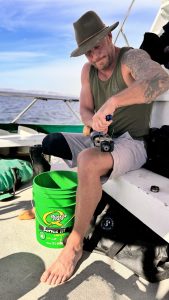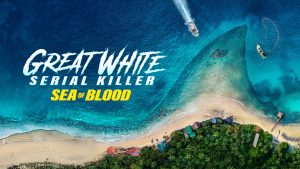Shark expert Paul de Gelder has had a busy year preparing for Discovery Channel’s thirty-sixth annual SHARK WEEK, which this year runs Sunday July 7 through Saturday July13.
De Gelder is involved in five SHARK WEEK programs this time around: SYDNEY HARBOR SHARK INVASION, which premieres Sunday July 7, GREAT WHITE SERIAL KILLER: SEA OF BLOOD, which premieres Monday July 8, DEADLIEST BITE, which premieres Tuesday July 9, and THE REAL SHARKANO and SHARK ATTACK ISLAND, both of which premiere Friday July 12.
DE GELDER: No, this was the first five months of this year [2024], so I’ve been diddy-bopping all over the world, doing different shows, with different scenarios, with different sharks, in different environments. It was a lot of work. All of my friends that work on SHARK WEEK have been doing the same thing since around probably August last year, trying to create these incredible shows. And I know that mine are really great, but my friends that do this as well, we have twenty-one hours of footage this year, and so, being the thirty-sixth year, we always want to excel, we always want to bring new stuff, and as crazy as my shows have been [laughs], I’m sure some of my friends out there doing SHARK WEEK as well have got even crazier stuff.
Speaking by Zoom to Assignment X, de Gelder explains that he spent the first five months of 2024 filming material for the SHARK WEEK specials. “I’ve been diddy-bopping all over the world, doing different shows, with different scenarios, with different sharks, in different environments. It was a lot of work. All of my friends who work on SHARK WEEK have been doing the same thing since around probably August last year, trying to create these incredible shows.
“I know that mine are really great, but my friends that do this as well, we have twenty-one hours of footage this year, and so, being the thirty-sixth year, we always want to excel, we always want to bring new stuff, and as crazy as my shows have been, I’m sure some of my friends out there doing SHARK WEEK as well have got even crazier stuff,” he laughs.
Given that sharks can be dangerous, do de Gelder and the SHARK WEEK camera crews – who dive with their arms full of equipment – often go into the water without a cage? De Gelder laughs again. “Yeah. We don’t use a cage terribly a lot.”
Some people may be surprised that de Gelder is so keen to be around sharks after an early experience that might have put other people off, and/or proved fatal. “I was actually attacked by a ten-foot bull shark in 2009, when I was a Navy bomb disposal diver in Sydney, Australia. The bull shark attacked me while I was doing a counterterrorism exercise with the Navy, and it ripped off my right hand and the hamstring of my right leg as well. So, I ended up losing my right leg.”
De Gelder now has a prosthetic hand and leg. However, “Even though I’ve lost two limbs to a shark, over the years, I’ve built up this appreciation for sharks, and how amazing they are. And so, I’ve partially dedicated my life to working on SHARK WEEK, and teaching people about how amazing they are. And really, if someone like me can get past their bias about sharks and learn to love and respect them, I really think that’s a very positive message that anyone can do that.”
GREAT WHITE SERIAL KILLER: SEA OF BLOOD examines what may have been behind several fatal shark attacks off the coast of the small Mexican mainland village of Yavaros, where many of the residents are fishermen. De Gelder cautions us not to read too much into the segment’s title.
“This is very SHARK WEEK-named,” he laughs. “Don’t let the sensational name throw you – ‘GREAT WHITE SERIAL KILLER: SEA OF BLOOD.’ This is a very serious investigation into why fishermen in the Sea of Cortez and, more specifically, Yavaros are being attacked by Great White sharks and killed, and how we can assist those fishermen maintain their fishing industry and their way of life without killing the sharks, and also keep the fishermen safe.”
This last includes devising a shark cage that the Yavaros citizens can afford and build themselves.
De Gelder doesn’t want to give away too much about the episode, including what the shark experts learned. “I’m not going to give you all the answers, you have to watch the show. We do a lot of investigating and talking to everyone involved, from families of the lost fishermen to people who were actually there on the boat when the fishermen were being attacked. We go diving in the area, we look at the whole region. And so, it is an in-depth investigation into why this is happening. So, really, I would love people to tune in and watch it and follow this investigation, and come on social media and add their thoughts to it as well, let us know what they think the cause is.”
Although he has traveled around the world researching sharks, de Gelder says this was his first visit to the Sea of Cortez. While regions off the Mexican coast are popular cage-diving locations, de Gelder says, “The Sea of Cortez is not, but I’ve done many cage-diving trips out to the other side of Baja, California, out to Isla Guadelupe, which has now been closed down by the Mexican government.”
The closure, de Gelder adds, is not due to an overabundance of sharks in the waters. “Absolutely not. It’s due to a lot of factors. Some of the tourist operators were abusing the rules, some of the people that were attending these trips were abusing the rules, there was trash. It was just becoming a bit of an ecological nightmare for them to try and manage it – well, that’s what they told us, anyway. You know what governments are like – they don’t tell you the whole truth. So, I don’t think we all really know why.”
With the five SHARK WEEK episodes de Gelder has done this year, does he have a favorite?
“I think the show I did in the Solomon Islands is probably going to be my favorite. It was originally going to be called ISLAND OF THE SHARK GODS, but now it’s called THE REAL SHARKANO. We went to this extremely remote area of the Solomon Islands, a chain of nine hundred islands in the South Pacific above Australia. And we [do] very first survey of shark species and quantity, to see what sharks were there, how many were there, is the Chinese fishing there affecting it all, are they destroying the reefs? But also, one of the most amazing things I ever did was free dive with sharks next to an underwater volcano while it was erupting.”
Sounds like the episode earned its THE REAL SHARKANO title.
Related: SHARK WEEK: 6000 LB. SHARK: Researcher Tom Hird on new shark documentary – Exclusive Interview
Follow us on Twitter at ASSIGNMENT X
Like us on Facebook at ASSIGNMENT X
Article Source: Assignment X
Article:SHARK WEEK: Shark expert Paul de Gelder on his five different specials – Exclusive Interview
Related Posts:













